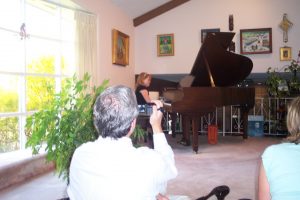
Although Suz and D were always on the same page, their roles as parents have always been rather different. My dad explained in his interview that “I probably, in today’s world, fall into being a more stringent parent than some of my friends may, but I’m balanced a little bit by your mother, who tends to be a little softer.” These complimentary temperaments led my father to be more of an authority figure who would ensure that my brother and I cleaned our rooms and did our homework, and my mother to be a source of comfort and scheduling. This scheduling was epitomized by her infamous whiteboard calendar, which displayed everyone’s schedules for the month on a huge whiteboard in our kitchen. This helped my parents to coordinate my childhood of concerted cultivation amongst their busy work schedules. In Annette Lareau’s famous book, Unequal Childhoods, she describes this phenomenon of concerted cultivation as “organized activities, established and controlled by mothers and fathers, [which] dominate the lives of middle-class children,” (1-2). For my family, these activities included ice hockey for my brother, ice skating and gymnastics for me, and swim team every summer for the both of us. My mother explained their philosophy behind this concerted cultivation:
“We wanted you to be in the ice show, and do whatever sports you wanted to do, or get involved in whatever interests you wanted to, we just wanted to take you lead, and expose you to a lot of things, and if there was something of interest to you let you pursue it.”
Our concerted cultivation was orchestrated by my parents, but they wanted to give my brother and I the freedom to chose what activities interested us, so as to pave our own paths.


My mom took their non-compulsory approach to parenting a step further by noting, “we didn’t want to pressure you too much, or be helicopter parents or tiger moms.” Many of her friends qualified as what author Laura Hamilton described as “pink helicopters” and “professional helicopters.” These moms put immense pressure on their daughters, either socially or academically, which often hurt the mental well-being of their children. Instead, my mom shared that, “we wanted you to be independent; we didn’t want to spoil you too much.” This meant not buying all of the latest fashion trends solely to fit in, and also encouraging my brother and I to demand academic success from ourselves, rather than work hard to satisfy my parents. My father confirmed this by saying, “our fundamental goal as parents was to be encouraging, help clear the way so you guys are successful, and make sure you guys can be independent when you’re grown ups.” They both expressed desires to have happy children, to let us chose our own activities, and to, as Suz put it, “expose [us] to things in life.” They agreed that family vacations to Tucson, Arizona were important for my brother and I to better know my mom’s loving parents, and that we should be sent to single-sex schools. Being on the same page, both in general desires such as instilling happiness and specific intentions like traveling to Arizona, kept Suz and D working as a team throughout my childhood.
